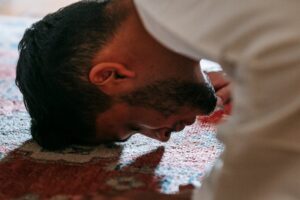I believe the term (Al-Ma’rouf) المعروف or (the known and accepted) is one of the most important terms in the Quran and Sunnah that we need to educate ourselves about. It is about the fairness, common sense and normal understanding of all aspects in life that Islam called on to be implemented and practiced. It is defined as: “Anything that is known in Sharia and minds as fair and good.”[1] The term originates in the ethics and morals that are at the core of Islamic teachings. The opposite term also used many times in the Quran, is (Al-Munkar) المنكر or (the unknown and rejected.)
I feel that codes of ethics and morality are not the driving force behind people’s lifestyles anymore. Many are living to feed their egos, bring satisfaction to their desires, and define life through the idea of pleasures only, regardless of the kind of harm that might accompany that on the individual level or the community level.
The Community of Al-Ma’rouf
Allah (SW) gave us the title: {The best Community ever} and it was based on the merit of {You enjoin what is right and you forbid what is wrong and you believe in God.} 3:110. Many people understand the term ‘enjoin’ as a kind of authority to be forced on people! To enjoin means to praise, as it was quoted linguistically by Abu Sufian (RAA) before he was a Muslim, he said: “The matter of the son of Abu Kabsha (Prophet Mohammad SAAW) has reached a level of undeniable praise.”[2] We are the Community of praising that which is the known and accepted, fair and right, logical and sensible. We can only sustain our priority and superiority over other nations by the value of Al-Ma’rouf practiced among us, and when we fail to do that we become unworthy of such uniqueness.
Al-U’rf العرف
One of the sources of rulings in Islam after the main (Quran, Sunnah, consensus and analogy) is Al-U’rf or the inherited, accepted and practiced traditions. Such traditions become known, accepted and a reference because of the value that settled in the hearts of people, one generation after another. Islam did not come to change such values but rather to build on them. The prophet (SAAW) said: “I was sent to complete the honorable (set of) ethics.”[3] For example, if you are to hire someone for a month of work, the U’rf or the tradition is that he will be off a day or two per week. These days off are based on the value of Al-Ma’rouf that a person needs to rest and cannot function properly working seven days a week.
Social arena & Al-Ma’rouf
If you trace the term Al-Ma’rouf in the Quran, you find it most used in social matters like marriage, divorce, child custody, etc. Most people’s problems come down to the issues among families, and Islam came to promote the practicing of the fair, right and accepted.
The title that Allah (SW) used as a theme in life between married couples was Al-Ma’rouf. Allah (SW) said: {Consort with them only in accordance with what is right and honorable.} 4:19.
In case a man divorced his wife and wanted to retain her, Allah (SW) used the term Al-Ma’rouf in his treatment towards her. {Wives are to be retained in accordance to what is right or set free with generous kindness.} 2:229.
In the case of caring for children after divorce, Allah (SW) advised both parents to remind each other what is the best for the children: {Indeed, you shall enjoin one another in accordance to what is right.} 65:6.
Even when a guardian is entrusted to care for an orphan who has wealth waiting for him upon maturity, Islam allowed the guardian to use some of the money in case he was a poor man, but only in Al-Ma’rouf. {But if one is poor, then let him consume of it only in accordance with what is right.} 4:6.
In conclusion, the quality of life is all about Al-Ma’rouf. We need to focus and educate ourselves on such important terms and definitions in Islam, and keep them in practice, especially as everything these days is being redefined away from ethics and morals.
The Community of Al-Ma’rouf shall rise and aspire, and the Community of Al-Munkar shall vanish and fail. May Allah keep us among the former and protect us from the latter.
By Sh Kifah Mustapha
[1] Tafseer Ibn Saadi
[2] Bukhari
[3] Ahmad




